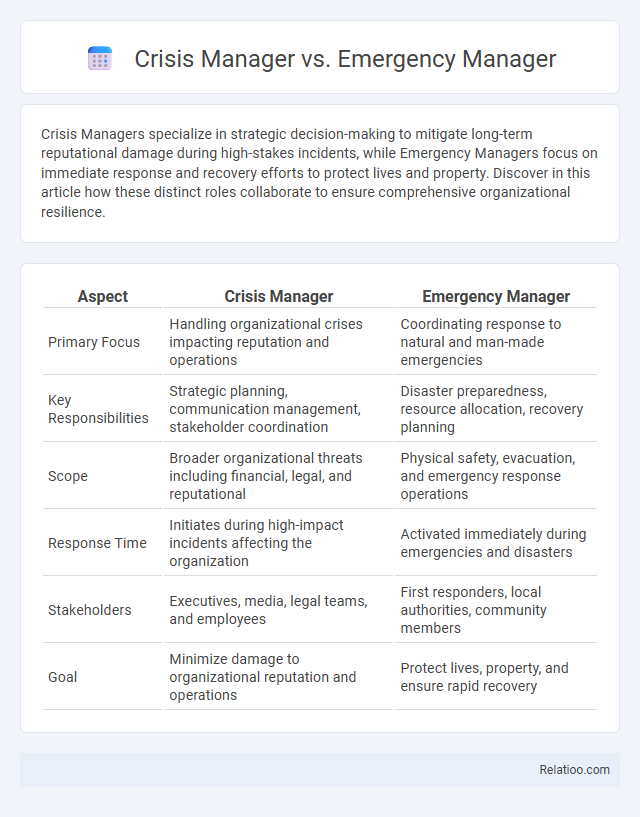Crisis Managers specialize in strategic decision-making to mitigate long-term reputational damage during high-stakes incidents, while Emergency Managers focus on immediate response and recovery efforts to protect lives and property. Discover in this article how these distinct roles collaborate to ensure comprehensive organizational resilience.
Table of Comparison
| Aspect | Crisis Manager | Emergency Manager |
|---|---|---|
| Primary Focus | Handling organizational crises impacting reputation and operations | Coordinating response to natural and man-made emergencies |
| Key Responsibilities | Strategic planning, communication management, stakeholder coordination | Disaster preparedness, resource allocation, recovery planning |
| Scope | Broader organizational threats including financial, legal, and reputational | Physical safety, evacuation, and emergency response operations |
| Response Time | Initiates during high-impact incidents affecting the organization | Activated immediately during emergencies and disasters |
| Stakeholders | Executives, media, legal teams, and employees | First responders, local authorities, community members |
| Goal | Minimize damage to organizational reputation and operations | Protect lives, property, and ensure rapid recovery |
Introduction to Crisis Management and Emergency Management
Crisis management focuses on identifying, assessing, and mitigating high-impact events that threaten an organization's stability, involving strategic planning and communication to minimize damage. Emergency management deals with structured responses to sudden incidents such as natural disasters or accidents, emphasizing preparedness, response, recovery, and mitigation phases. Understanding the distinction helps you implement effective organizational policies tailored to both crisis prevention and emergency response, ensuring resilience and safety.
Defining the Roles: Crisis Manager vs Emergency Manager
Crisis Managers primarily focus on strategic decision-making and communication during high-impact business disruptions, ensuring organizational resilience and reputation management. Emergency Managers concentrate on tactical operations, coordinating immediate response efforts to natural disasters, hazards, or life-threatening emergencies, emphasizing safety and resource allocation. While both roles are critical in risk management, Crisis Managers address long-term recovery and stakeholder communication, whereas Emergency Managers handle frontline incident response and mitigation.
Key Responsibilities of a Crisis Manager
A Crisis Manager specializes in identifying potential risks, developing response strategies, and leading coordination efforts during critical incidents to minimize impact on operations and reputation. Unlike Emergency Managers who primarily focus on immediate response and recovery during natural disasters or large-scale emergencies, Crisis Managers oversee broader organizational crises including financial, reputational, or security threats. Your success in handling crises depends on proactive planning, stakeholder communication, and swift decision-making rooted in comprehensive risk assessments.
Primary Duties of an Emergency Manager
Emergency managers primarily focus on preparedness, response, and recovery efforts related to natural disasters, accidents, and other emergencies, coordinating resources and communication among agencies. Crisis managers handle high-pressure situations that threaten an organization's stability, emphasizing strategic decision-making and maintaining business continuity. While both roles overlap, emergency managers specialize in public safety and disaster mitigation, ensuring community resilience through planning, training, and operational response.
Core Skills and Competencies Compared
Crisis Managers excel in strategic decision-making, communication, and risk assessment to navigate complex, high-stakes situations, while Emergency Managers focus on operational response, resource coordination, and incident management during disasters. Both roles require strong leadership, problem-solving, and situational awareness, but Crisis Managers prioritize long-term recovery plans and stakeholder engagement, whereas Emergency Managers emphasize rapid deployment and logistical support. Core competencies overlap in crisis communication, resource allocation, and team coordination, yet each role demands specialized expertise tailored to either proactive crisis mitigation or reactive emergency response.
Differences in Approach: Crisis vs Emergency Management
Crisis managers focus on long-term recovery, strategic decision-making, and managing complex, unpredictable situations that threaten an organization's reputation or operations. Emergency managers prioritize immediate response, resource coordination, and ensuring safety during natural disasters or sudden incidents, emphasizing rapid action and containment. Understanding these differences allows you to tailor your response strategies effectively, aligning goals with either proactive crisis mitigation or urgent emergency intervention.
Tools and Methodologies Used by Each Role
Crisis Managers employ risk assessment frameworks, scenario planning software, and communication platforms to coordinate responses and minimize operational disruptions. Emergency Managers utilize incident command systems (ICS), geographic information systems (GIS), and resource management tools designed for rapid deployment and coordination during natural disasters or public safety events. Crisis Managers integrate data analytics, stakeholder engagement techniques, and decision support systems to navigate reputational risks and strategic challenges in real-time crisis environments.
Collaboration and Communication Strategies
Crisis Managers and Emergency Managers both prioritize effective collaboration and communication strategies, but Crisis Managers focus on managing complex, long-term disruptions requiring coordination across multiple sectors, while Emergency Managers handle immediate, short-term incidents with rapid response communication protocols. Crisis Managers implement integrated communication frameworks to align stakeholders, including public relations teams and government agencies, ensuring consistent messaging during prolonged crises. Emergency Managers emphasize real-time information sharing through incident command systems, facilitating swift decisions and resource allocation to mitigate urgent threats.
Real-World Examples and Case Studies
Crisis managers focus on strategic decision-making during high-impact situations like corporate scandals, exemplified by Johnson & Johnson's Tylenol recall, whereas emergency managers coordinate operational response to natural disasters such as FEMA's handling of Hurricane Katrina. Real-world case studies highlight that crisis managers emphasize brand reputation and communication strategies, while emergency managers prioritize logistics, resource deployment, and public safety protocols. Hybrid roles have emerged in scenarios like the COVID-19 pandemic, where leaders integrated crisis communication with emergency response coordination to navigate complex, evolving threats.
Which Role Does Your Organization Need?
Crisis Managers specialize in strategic decision-making during significant disruptions, focusing on long-term recovery and organizational resilience. Emergency Managers coordinate immediate responses to disasters, managing resources and communication to protect lives and property during the event. Your organization needs to evaluate whether prioritizing rapid operational response or comprehensive crisis recovery aligns better with its risk profile and business continuity goals.

Infographic: Crisis Manager vs Emergency Manager
 relatioo.com
relatioo.com